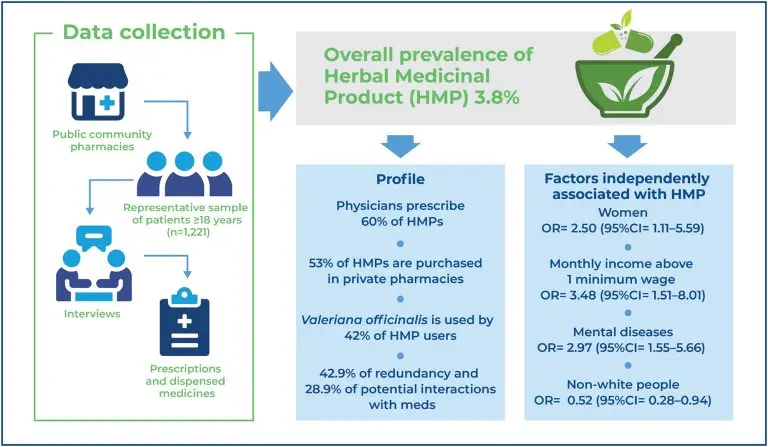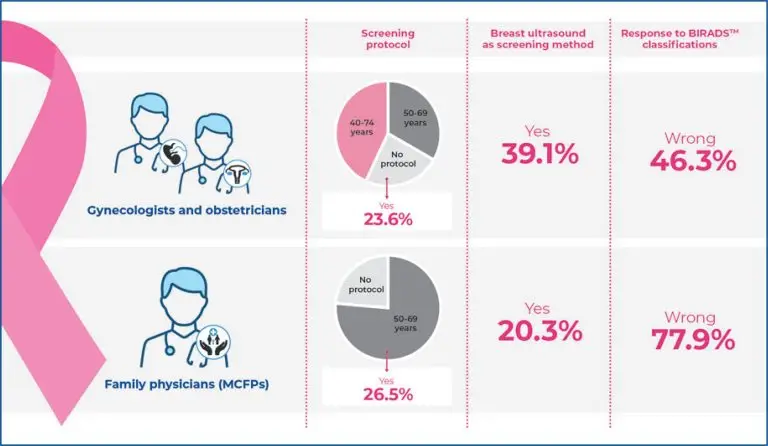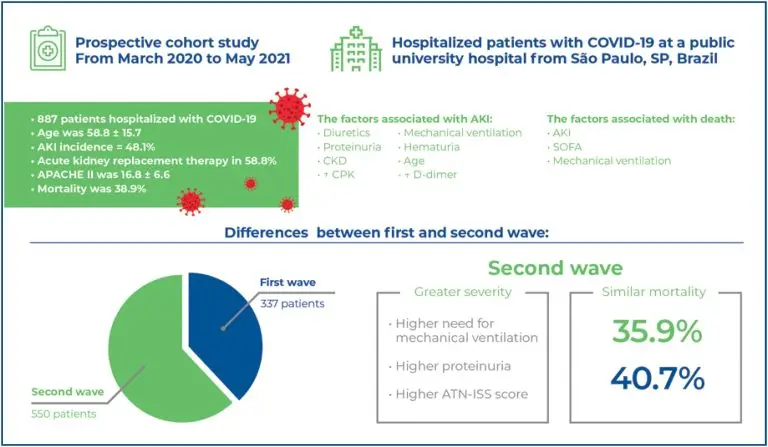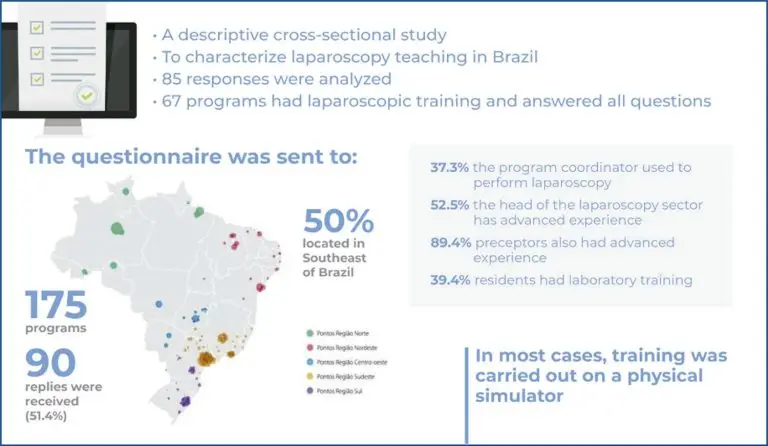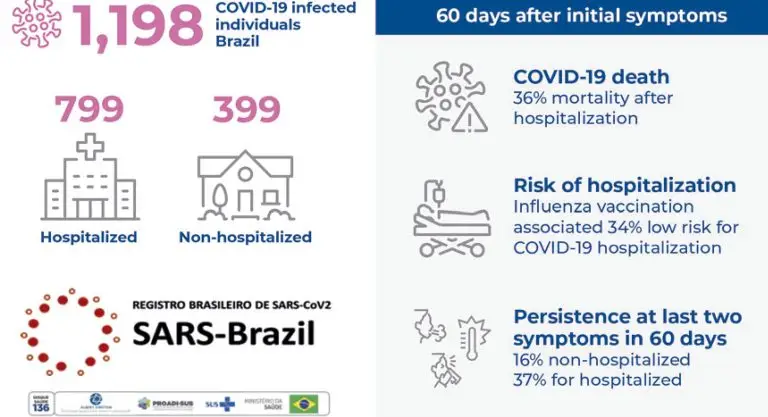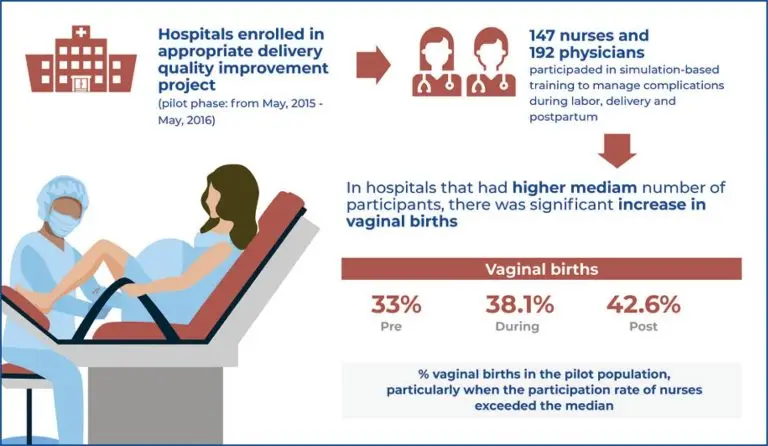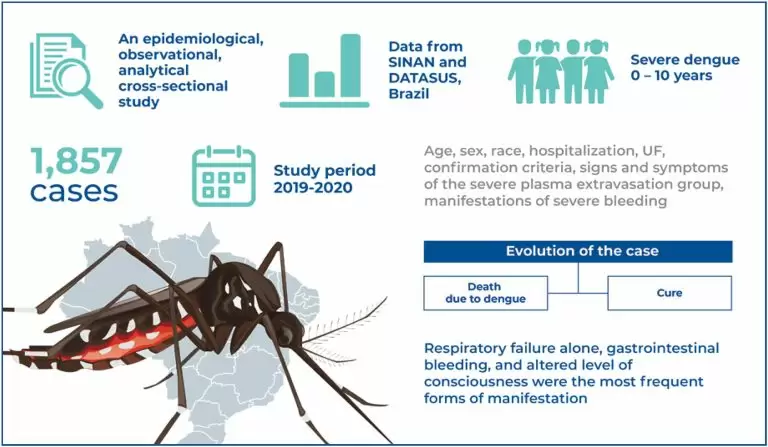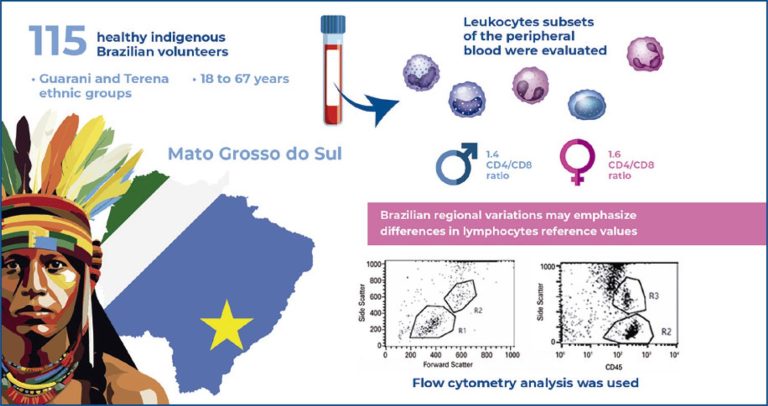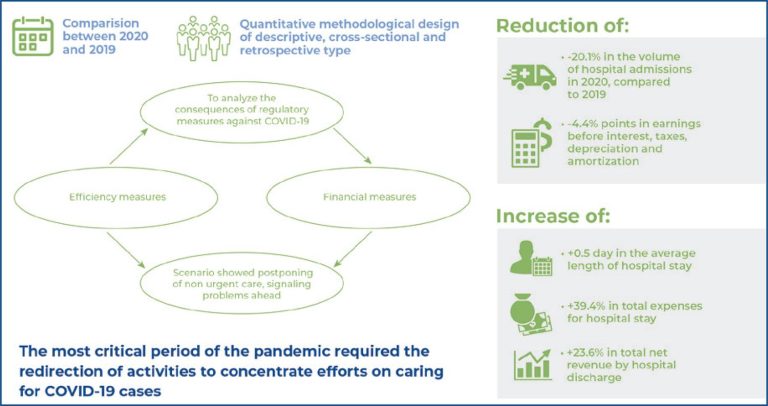21/Oct/2024
Use of herbal medicinal products among patients in primary health care in a Brazilian southeastern city: evidence from the Prover project
einstein (São Paulo). 21/Oct/2024;22:eAO0827.
View Article21/Oct/2024
Use of herbal medicinal products among patients in primary health care in a Brazilian southeastern city: evidence from the Prover project
DOI: 10.31744/einstein_journal/2024AO0827
Highlights Herbal medicinal product use was 3.8%, with high formal prescription; however, it is accompanied by a high risk of interactions and redundancy. Unified Health System pharmacies are not the main source of herbal medicinal products, suggesting low service implementation. Women, people with mental disorders, and allopathy simultaneously users should receive attention. Non-white people are less likely to use herbal medicinal product, suggesting inequalities in accessing these treatments. ABSTRACT Objective: To determine the prevalence and factors associated with herbal medicinal […]
Keywords: Brazil; Epidemiology; Phytotherapy; Plants, medicinal; Primary Health Care; Risk Factors
07/Oct/2024
Knowledge related to breast cancer screening programs by physicians in Brazil
DOI: 10.31744/einstein_journal/2024AO0760
Highlights Variability in screening protocols: only 42.8% of gynecologists and obstetricians follow the 40-74 years protocol, while 76.6% of family physicians follow the 50-69 years protocol. High rate of incorrect BIRADS™ interpretation: there were 46.3% incorrect responses among gynecologists and obstetricians and 77.9% among family physicians, highlighting significant knowledge gaps. Misconception about breast ultrasound: 39.1% of gynecologists and obstetricians and 20.3% of family physicians incorrectly consider ultrasound as a screening method. Impact of inadequate training: inadequate training leads to improper […]
Keywords: attitudes; Brazil; Breast neoplasms; Family; Gynecologists; Health knowledge; Mammography; Mass screening; Obstetricians; Physicians; practice; Preventive medicine; Surveys and questionnaires
25/Sep/2024
Acute kidney injury in coronavirus disease: a comparative study of the two waves in Brazil
DOI: 10.31744/einstein_journal/2024AO0687
ABSTRACT Highlights Renal involvement was frequent in patients with COVID-19 and related to worse outcomes. Diuretic use, mechanical ventilation, proteinuria, hematuria, age, and creatine phosphokinase and D-dimer levels were risk factors for acute kidney injury. Acute kidney injury, mechanical ventilation, elevated SOFA Score, and elevated ATN-ISS were associated with mortality. The second wave was associated with greater severity; however, the mortality rates were similar between the two periods. This may reflect the effectiveness of vaccines and the constant learning that […]
Keywords: Acute kidney injury; Brazil; Coronavirus infections; COVID-19; Incidence; Mortality; Prognosis; Receptor cross-talk
20/Aug/2024
Current status of laparoscopy teaching in gynecology and obstetrics medical residency in Brazil
DOI: 10.31744/einstein_journal/2024AO0458
Highlights Only 20% of the medical residency programs have laparoscopic teaching. Preceptors of the residency programs have advanced experience. Most programs have no plan to set up a training center. Resideny programs are concentrated in the Southeast region and in capitals. ABSTRACT Objective: To characterize laparoscopy teaching in Medical Residency Programs in Gynecology and Obstetrics in Brazil, and to evaluate preceptors’ characteristics in laparoscopy programs and map laparoscopic training practice scenarios. Methods: This descriptive cross-sectional study evaluated questionnaire responses from […]
Keywords: Brazil; Education, medical; Health Knowledge, Attitudes, Practice; Internship and residency; Laparoscopy; Minimally invasive surgical procedures; Surveys and questionnaires
22/Jul/2024
Mortality, hospitalizations, and persistence of symptoms in the outpatient setting of the first COVID-19 wave in Brazil: results of SARS-Brazil cohort study
einstein (São Paulo). 22/Jul/2024;22:eAO0652.
View Article22/Jul/2024
Mortality, hospitalizations, and persistence of symptoms in the outpatient setting of the first COVID-19 wave in Brazil: results of SARS-Brazil cohort study
DOI: 10.31744/einstein_journal/2024AO0652
Highlights Previous influenza vaccination was associated with a reduced need for hospitalization after COVID-19 diagnosis. In 60 days of outpatient setting, four deaths occurred (three in the hospitalized and one in the non-hospitalized group). The persistence of more than two symptoms in 60 days was observed in 31.9% of patients. ABSTRACT Objective: To evaluate deaths, hospitalizations, and persistence of symptoms in patients with COVID-19 after infection in an outpatient setting during the first COVID-19 wave in Brazil. Methods: This prospective […]
Keywords: Brazil; Coronavirus infections; COVID-19; Hospitalization; Intensive care unit; Length of stay; Long-term COVID-19 symptoms; Mortality; SARS-CoV-2
18/Jul/2024
Appropriate Delivery Project: Impact of Simulation Training on the Increase in Vaginal Births in Hospitals in Brazil
DOI: 10.31744/einstein_journal/2024AO0783
Highlights Simulation-based training is a valuable strategy for achieving positive changes in obstetric practice. The rate of vaginal births increased after the intervention. The findings underscore the potential advantages of incorporating simulation training into quality improvement initiatives. Higher training adoption rates correlated with substantial and sustained enhancements in vaginal birth rates. ABSTRACT Objective: This study aimed to analyze the relationship between the participation of professionals in simulation-based training and an increase in the rate of vaginal deliveries. Methods: This retrospective […]
Keywords: Brazil; Cesarean section; Delivery, obstetric; Simulation training
11/Apr/2024
Analysis of signs and symptoms in confirmed cases of severe dengue among children aged 0 to 10 years old
DOI: 10.31744/einstein_journal/2024AO0546
Highlights The average age was 4.34±2.56 years. Highest prevalence in Brown and White races. Highest prevalence rate was found in the Southeast, followed by the Central-West and South. The majority of analyzed cases progressed to hospitalization. Prevalent respiratory failure, hematemesis, and melena are associated with both. Prevalence of changes in the level of consciousness, which is important at the central nervous system level. ABSTRACT Objective: The prevalent symptoms of severe dengue in pediatric patients are divided into three subgroups: severe […]
Keywords: Brazil; Child; Dengue; Epidemiology; Signs and symptoms
30/Oct/2023
Autism spectrum disorder in a patient with Nicolaides-Baraitser Syndrome: case report
DOI: 10.31744/einstein_journal/2023RC0480
ABSTRACT Nicolaides-Baraitser Syndrome is a rare genetic condition that clinically presents with intellectual disabilities, facial and bone changes, and sparse hair. In Brazil, only one case has been previously reported without genetic confirmation. We present the case of an 8-year-old boy, clinically and genetically diagnosed with Nicolaides-Baraitser Syndrome, who developed autism spectrum disorder characteristics with a formal diagnosis at the age of eight. Diagnosing autism spectrum disorder in patients with intellectual disabilities is a clinical challenge requiring careful evaluation.
Keywords: Autism spectrum disorder; Brazil; Neurodevelopmental Disorders; Nicolaides Baraitser syndrome
11/Oct/2023
Determining reference ranges for immunological cells of healthy indigenous individuals from a region in Brazil
einstein (São Paulo). 11/Oct/2023;21:eAO0291.
View Article11/Oct/2023
Determining reference ranges for immunological cells of healthy indigenous individuals from a region in Brazil
DOI: 10.31744/einstein_journal/2023AO0291
Highlights The relative medians of CD3+, CD4+, and CD8+ T cells were significantly higher in women than in men in a healthy indigenous population. Demographic and ethnic diversity of the Brazilian population can be associated with quantitative modifications in the immunologic cells of healthy individuals. Objective: The establishment of reference values for a subset of leukocytes is common in clinical practice, and ethnic variations are strongly associated with disease development. In Brazil, indigenous people are vulnerable to infections, and few […]
Keywords: Antibodies; Brazil; Health Services; Immune system; indigenous; Indigenous peoples; Lymphocytes; monoclonal; Monocytes; Reference values
11/Oct/2023
Impacts of the COVID-19 pandemic on private hospitals in Brazil
DOI: 10.31744/einstein_journal/2023AO0174
Highlights Sanitary restriction measures had a strong impact on usual performance indicators from a selected group of private hospitals in Brazil. Pregnancies and deliveries continued to constitute an important proportion of hospital admissions because they did not depend on external restrictions. Hospital costs increased due to increased utilization of more expensive Personal Protection Equipment (due to lack of availability or much higher demand). ABSTRACT Objective: To analyze the operational and/or financial impacts of regulatory measures implemented by the National Agency […]
Keywords: Brazil; Brazilian Health Surveillance Agency; Coronavirus infections; Cost of illness; COVID-19; Health care costs; Hospitals; Pandemics; private


